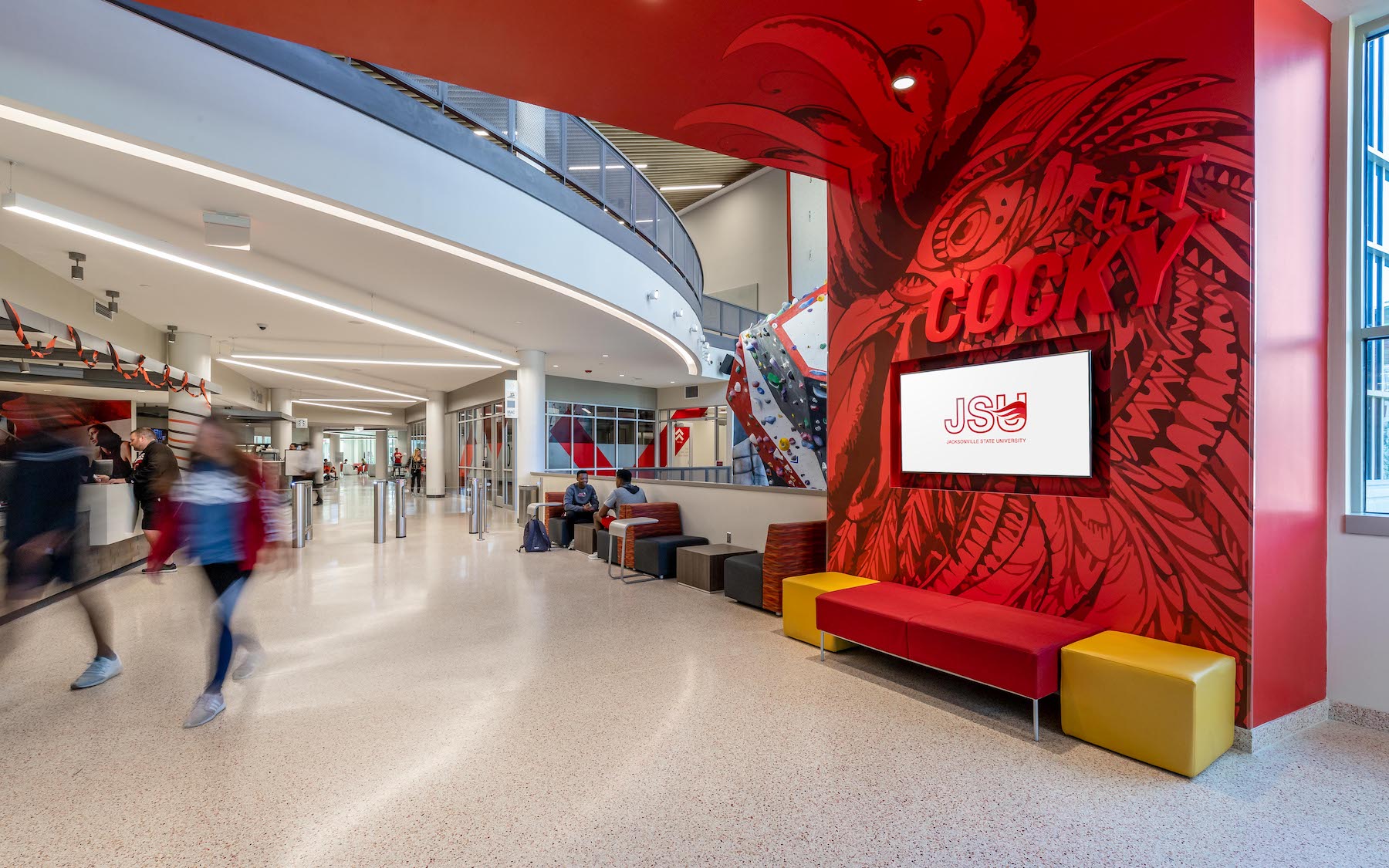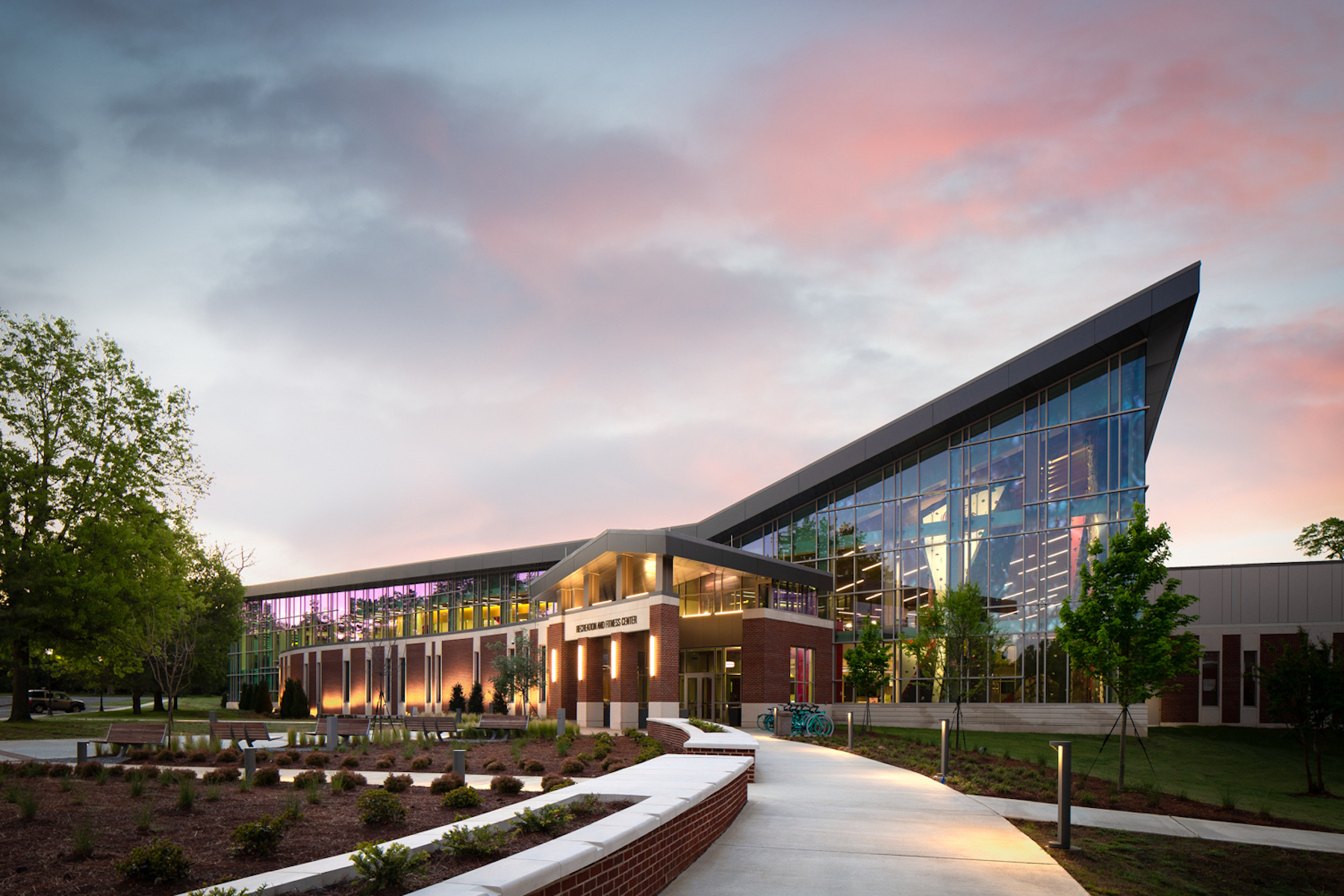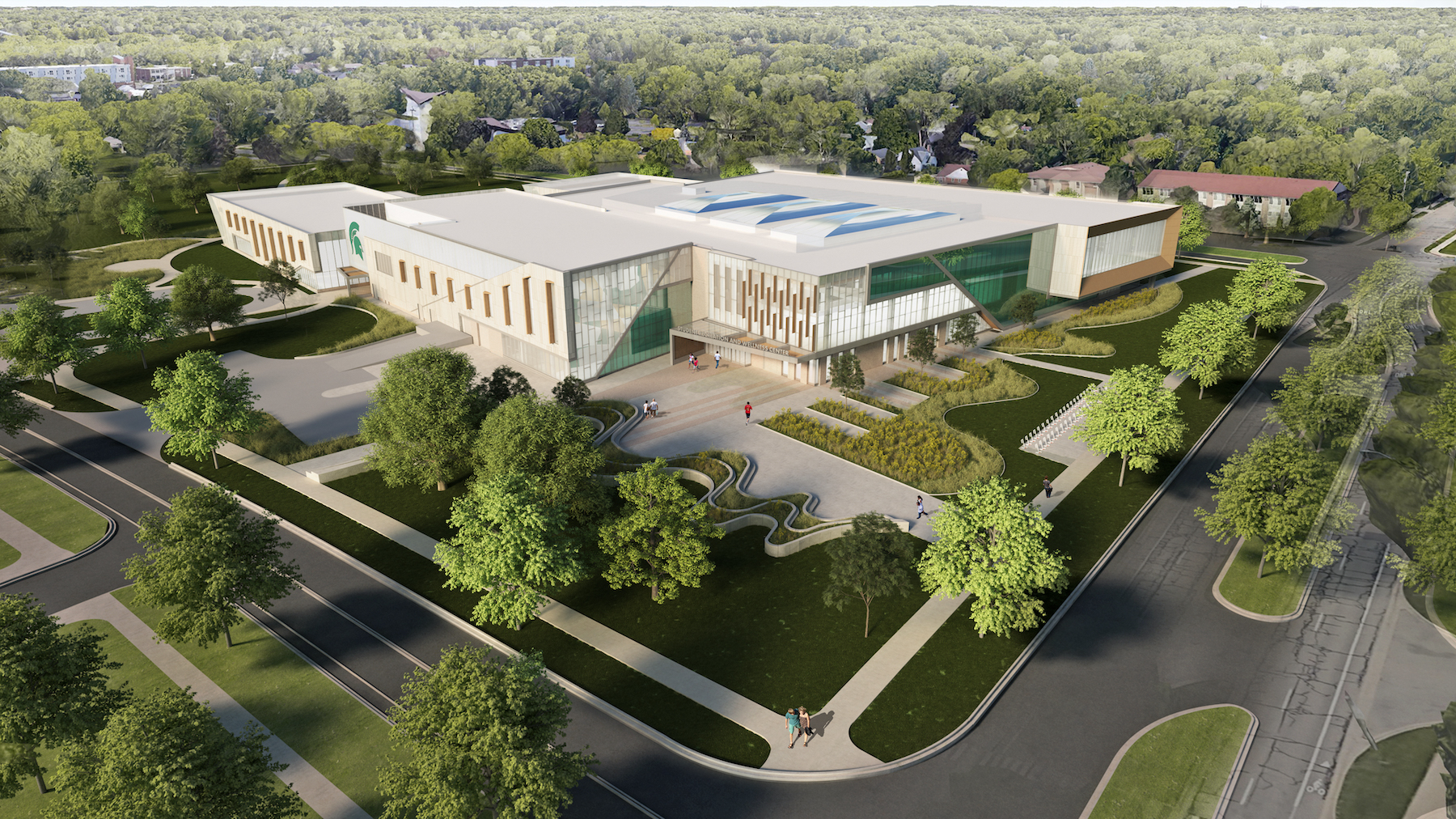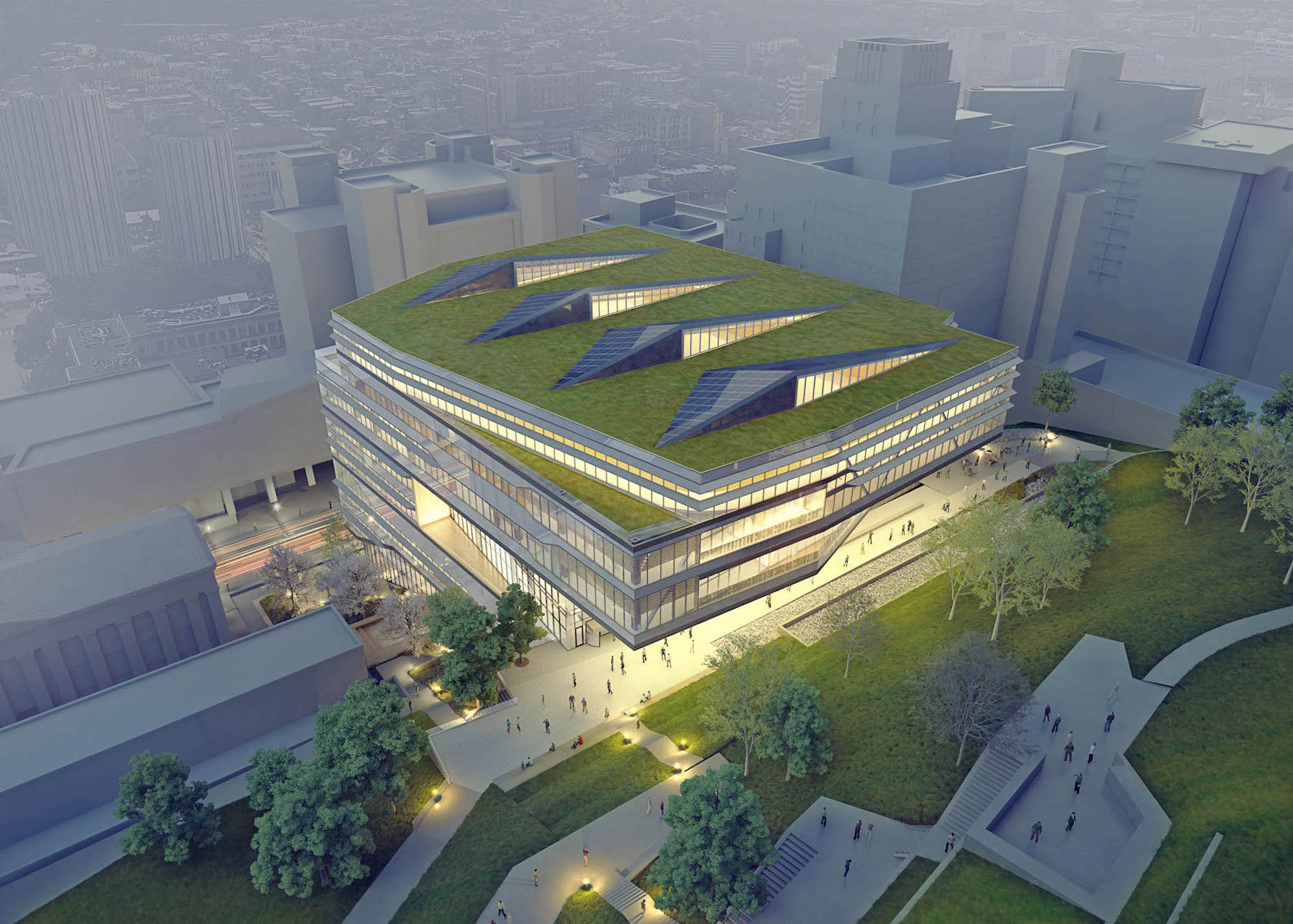On September 29 of last year, the University of Pittsburgh broke ground at its Oakland campus on a new Recreation and Wellness Center, a $255 million project whose 270,000 square feet will spread over nine stories, making this the tallest building of its kind in the U.S. when it opens in the fall of 2024.
Around the same time of the groundbreaking, Michigan State University in East Lansing was moving forward on its plans for a three-story 300,000-sf Health and Wellness Center that is scheduled to open in 2025, and whose design and programming were informed by focus groups with students.
The common thread connecting these projects is their design architect, Columbus, Ohio-based Moody Nolan, which celebrates its 40th anniversary last year. Over the past quarter-century, Moody Nolan has become one of the industry’s leading specialists in the creation of collegiate recreation facilities, according to Campus Rec magazine. The firm’s signature in this typology is designing rec centers to be campus destinations.
As such, Moody Nolan has had a ringside seat to watch how demand for rec centers has evolved to incorporate user well-being. “Our clients aren’t only concerned about physical space, but are also asking ‘why’ about these projects,” says Troy Sherrard, FAIA, a Partner and Sports + Recreation Practice Design Leader, who has been with the firm for 20 years. Consequently, he continues, more clients are requesting “hybrid environments” that “build habits” for health and wellness in students.
Shared spaces a priority for recreation centers


Sherrard says that certain “traditional” spaces, like athletic fields and courts, and even aquatic amenities, are still must haves in rec centers. On the other hand, Moody Nolan has seen less demand lately for racquet sports spaces, and more demand for “shared spaces,” such as turf gyms within fieldhouses, and climbing and bouldering options. Clients also want multipurpose rooms for activities that range from “high energy to mediation,” says Sherrard, who spoke with BD+C last week.
He points specifically to the 101,000-sf, $30 million rec center at Jacksonville State University in Alabama, which opened in January 2019. Sherrard says prior to that opening, fitness and wellness were not prevalent concerns for most rural southern schools. Jacksonville State, conversely, saw the new rec center—which would have the largest footprint of any building on its campus—as one of its “anchors.”
The building’s highlights, says Sherrard, feature a 43-ft-tall outdoor climbing wall, social engagement spaces that include a campus “living room,” and an outdoor “adventure” component for biking and walking. Sherrard adds that rec centers need to be immersive, which in Jacksonville State’s case meant telling a design story through branding “to root the student in a sense of place.” (He notes that anyone walking into this rec center can see most of its rooms at first glance.)
How recreation centers can reinforce student health
After Jacksonville State opened its rec center, its enrollment for the next fall semester jumped by 6 percent. (The school’s full- and parttime enrollment for the fall of 2022 was 9,633, compared to 7,696 in the spring of 2018.)
Other campuses around the country flaunt their recreational and athletic facilities as recruitment bait. “That always comes up, and without [a rec center] there’s a void,” says Sherrard. He points out that Penn State University’s rec center (designed by his firm) is across the street from the college’s Admissions building, so the rec center is the first thing prospective and incoming students and their parents see, accentuating the college’s commitment to health and wellness.

Appealing to student needs is at the forefront of rec center design and operations, says Sherrard. Moody Nolan’s focus groups for the Michigan State University project (for which Rossetti is the AOR) revealed two desired trends that became key design drivers: biophilia and what Sherrard calls “zones for discovery.”
This rec center’s design is created around a courtyard. According to MSU, the building’s front façade opens to an outdoor greenspace with “large spans of glass for natural daylight and ventilation, allowing for integrated indoor-outdoor functional fitness experiences.”
Each floor of Pitt’s Recreation and Wellness center will have a different emphasis: dining, free weights, swimming and aquatic exercise, a gym, a jogging track, a multipurpose room, etc. The building itself, built into an 85-ft hillside, will connect Pitt’s upper and lower campuses. Also built into the hillside will be a 160-step “Panther Run,” that includes an outdoor platform halfway up for fitness classes.
Given its verticality, Pitt’s Recreation and Wellness center “could be a game changer” for urban-situated rec centers, says Sherrard.
Related Stories
| Aug 11, 2010
Burt Hill, HOK top BD+C's ranking of the nation's 100 largest university design firms
A ranking of the Top 100 University Design Firms based on Building Design+Construction's 2009 Giants 300 survey. For more Giants 300 rankings, visit http://www.BDCnetwork.com/Giants
| Aug 11, 2010
PCL Construction, HITT Contracting among nation's largest commercial building contractors, according to BD+C's Giants 300 report
A ranking of the Top 50 Commercial Contractors based on Building Design+Construction's 2009 Giants 300 survey. For more Giants 300 rankings, visit http://www.BDCnetwork.com/Giants
| Aug 11, 2010
Webcor, Hunt Construction lead the way in mixed-use construction, according to BD+C's Giants 300 report
A ranking of the Top 30 Mixed-Use Contractors based on Building Design+Construction's 2009 Giants 300 survey. For more Giants 300 rankings, visit http://www.BDCnetwork.com/Giants
| Aug 11, 2010
Jacobs, HDR top BD+C's ranking of the nation's 100 largest institutional building design firms
A ranking of the Top 100 Institutional Design Firms based on Building Design+Construction's 2009 Giants 300 survey. For more Giants 300 rankings, visit http://www.BDCnetwork.com/Giants
| Aug 11, 2010
Polshek Partnership unveils design for University of North Texas business building
New York-based architect Polshek Partnership today unveiled its design scheme for the $70 million Business Leadership Building at the University of North Texas in Denton. Designed to provide UNT’s 5,400-plus business majors the highest level of academic instruction and professional training, the 180,000-sf facility will include an open atrium, an internet café, and numerous study and tutoring rooms—all designed to help develop a spirit of collaboration and team-oriented focus.
| Aug 11, 2010
UCLA to get more graduate housing
The University of California, Los Angeles, has begun a new graduate housing project that will occupy 275,000 sf of the campus. The Wayburn Terrace Graduate Housing Project, led by California-based construction management and consulting firm Gafcon, includes a residential building comprising 500 studio apartments, a commons building, and administrative offices.
| Aug 11, 2010
Fashion school gives old building a make over
A new art facility for LIM, the College for the Business of Fashion, in midtown Manhattan is the result of a gut renovation of a six-story townhouse-school built in 1880. The new facility will continue LIM's mission of educating undergraduates on the business side of fashion. Architecture firm Butler Rogers Baskett transformed the old building's claustrophobic layout into a modern, multifunctio...
| Aug 11, 2010
Biomedical center to join London's research scene
The UK Centre for Medical Research and Innovation, a partnership of scientific organizations researching new treatments for illnesses such as cancer and heart disease, hopes to attract leading medical scientists to its planned research center. Designed by HOK London, the building will be located on 3.
| Aug 11, 2010
San Diego Mesa College enhances math and science facilities
A $92 million, 180,000-sf instructional center soon will rise at the heart of San Diego Mesa College in California. Slated to open in November 2012, the Math and Science Building will be funded by Propositions S and N construction bond program. The blueprint calls for four floors of classrooms, laboratory space, and offices for several science departments.
| Aug 11, 2010
Tufts University puts bite into new dental school addition
The recently dedicated Tufts University School of Dental Medicine, in Boston, represents the culmination of a 22-month vertical expansion of the school's original 1972 building. The $68 million project involved constructing five new stories totaling 95,000 sf atop the building's existing 10 stories, which were also remodeled.







